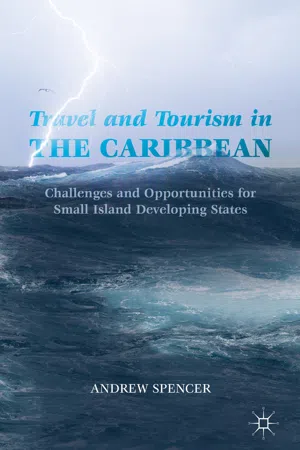For many, the Caribbean is synonymous with tourism. Warm beaches and warm smiles have gained remarkable importance since the 1960s in the post-independence and post-agricultural era of the region. But what is tourism? Tourism is just one form of activity undertaken during a period of leisure. Leisure is defined as “free time” or “time at one’s disposal” and therefore can be taken to embrace any activity apart from work and obligatory duties. Leisure can entail active engagement in play or recreation or even more passive pastimes such as watching television or even sleeping. Sports activities, games, hobbies, pastimes, and tourism are all forms of recreation and discretionary uses of our leisure time. Tourism, as one element of leisure, involves the movement of a person or persons away from their normal place of residence: a process that usually incurs some expenditure, although this is not necessarily the case. Someone cycling or hiking in the countryside on a camping weekend in which they carry their own food may make no economic contribution to the area in which they travel, but, nonetheless, be counted as a tourist. Many other examples could be cited in which expenditure by the tourist is minimal. We can say, then, that tourism is one aspect of leisure that usually, but not invariably, incurs some expenditure of income and that, further, money spent has been earned within the area of normal residency, rather than at the destination.
The World Tourism Organization (UNWTO) describes tourism as activities of a person travelling to a place outside his or her usual environment for less than a specified period of time and whose main purpose of travel is other than the exercise of an activity remunerated from within the place visited (UNWTO ). For the purpose of this text, international tourism will be the focus (travel to a foreign country), though domestic tourism (activities of a resident visitor within the country of residence) is of growing import as countries such as Jamaica channel marketing funds into promoting “staycations” among locals. Traditional holiday and vacation travel has also been buttressed by increased attention to business tourism. The World Tourism Organisation (WTO), for instance, notes that business travellers account for 15% of global overnight visitors and there are signs that other forms of tourism including medical, sport, gastronomic, religious, and other burgeoning models are picking up speed in the region.
Features of tourism vary between and among destinations; however, main elements of the tourism product include accommodation, transportation, attractions and tours, dining, and entertainment and support services. The supply chain comprises the suppliers of all the goods and services that go into the delivery of tourism products to consumers. It includes all suppliers of goods and services whether or not they are directly contracted by tour operators or by their agents (including ground handlers) or suppliers (including accommodation providers). Tourism supply chains involve many components—not just accommodation, transport, and excursions, but also bars and restaurants, handicrafts, food production, waste disposal, and the infrastructure that supports tourism in destinations. Traditional accommodations include hotels, villas, apartments, guest houses. These intimate small-scale properties provide visitors with greater opportunities to “create their own vacation”. In more recent times with the advent of Airbnb,1 private homes afford accommodation to millions of visitors worldwide.
Tourism cannot survive without the ability to travel. The entire industry is hinged on the free movement of persons from one place to another. It is largely due to the improvement of transportation that tourism has expanded. The advent of flight has shrunk the world, and the motor vehicle has made travel to anywhere possible. Linkage by air, sea, and land modes is essential for tour operations as well as the availability of support services such as fuel stations, auto repair, motels, and rest facilities for land travel. Importantly, the tra...
